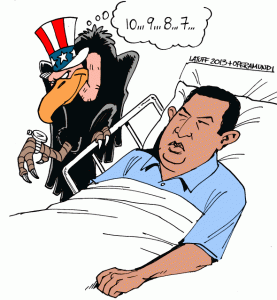 My column published today in McClatchy-Tribune Company newspapers:
My column published today in McClatchy-Tribune Company newspapers:
Hugo Chávez’s Career Deserves Honest Assessment
As Venezuelan President Hugo Chavez fights for his life, an honest assessment of his 14 years in office must take into account his significant achievements.
From humble origins, Chavez worked his way up the ranks of the Venezuelan military. He hit the national spotlight in 1992 after leading military officers in a failed coup attempt.
In a televised address, Chavez admitted the power grab had failed – “for now,” as he ominously put it. For many viewers, the obscure colonel became a national folk hero, someone who had finally stood up to a corrupt regime.
Six years later, Chavez won the presidency on a platform of shaking up the nation’s political system and using the country’s vast oil wealth to improve living standards.
He managed to do both.
For decades, the country’s massive oil reserves – estimated to be larger than Saudi Arabia’s – benefitted only a tiny elite, while millions wallowed in grinding poverty.
But since the Chavez government gained control of the oil industry in 2003, the proportion of Venezuelans living in poverty has been cut in half, from 60 percent to 30 percent. Health care and a college education – once luxuries enjoyed only by the wealthy – have become widely and freely available. And the country is now practically free of illiteracy.
Critics often question Chavez’s democratic credentials, but he and his party have won 13 of the last 14 national elections. Voter turnout reached 80 percent during the last election – far surpassing U.S. averages.
During his first year in office, voters approved a new constitution that dramatically boosted citizen involvement in government. Millions of poor Venezuelans now participate in local planning councils and in the naming of public officials. The slums are packed with communal councils and other civic organizations.
The government has also democratized access to the media by funding community TV and radio stations in poor barrios.
Chavez’s impact extends far beyond Venezuela’s borders, particularly as the most active proponent of Latin American integration. Besides building badly needed regional infrastructure – like highways and pipelines – integration efforts have given Latin America a much stronger position on the world stage.
By helping establish regional bodies such as the Union of South American Nations, Chavez has enabled the region to chart a more independent path from Washington.
For Chavez, this has been in keeping with his attempt to fulfill the unrealized dream of his personal hero, South American independence fighter Simon Bolivar.
Chavez’s death would be a great loss not only for Venezuela, but for all of Latin America.
From McClatchy-Tribune.
